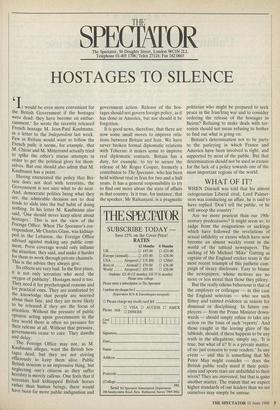The Spectator, 56 Doughty Street, London WC1N 2LL Telephone 01-405
1706; Telex 27124; Fax 242 0603
HOSTAGES TO SILENCE
It would be even more convenient for the British Government if the hostages were dead: they have become an embar- rassment.' So wrote the recently released French hostage M. Jean-Paul Kaufmann, in a letter to the Independent last week. Few in Britain would want to follow the French path: it seems, for example, that M. Chirac and M. Mitterrand actually tried to spike the other's rescue attempts in order to get the political glory for them- selves. But one should also admit that M. Kaufmann has a point. Having enunciated the policy that Bri- tain does not deal with terrorists, the Government is not sure what to do next. And, democratic politics being what they are, the admirable decision not to deal tends to slide into the bad habit of doing nothing. In his letter M. Kaufmann also said, 'One should never keep silent about hostages.' This is not the view of the Foreign Office. When The Spectator's cor- respondent, Mr Charles Glass, was kidnap- ped in the Lebanon, the Foreign Office advised against making any public com- ment. Press coverage would only inflame the situation, they said, and make it harder for them to work through private channels. This is the advice they always give. Its effects are very bad. In the first place, it is not only terrorists who need 'the oxygen of publicity'. Hostages need it too. They need it for psychological reasons and for practical ones. They are comforted by the knowledge that people are worried about their fate, and they are more likely to be released if they are the focus of attention. Without the pressure of public Opinion acting upon governments in the free world there is often no pressure for their release at all. Without that pressure, governments cease to care. They dawdle and delay. The Foreign Office may not, as M. Kaufmann alleges, want the British hos- tages dead, but they are not striving officiously to keep them alive. Public British stoicism is an impressive thing, but neglecting one's citizens as they suffer horribly is merely callous. One feels that if terrorists had kidnapped British horses rather than human beings, there would have been far more public indignation and government action. Release of the hos- tages should not govern foreign policy, as it has done in America, but nor should it be forgotten.
It is good news, therefore, that there are now some small moves to improve rela- tions between Britain and Iran. We have never broken formal diplomatic relations with Teheran: it makes sense to improve real diplomatic contacts. Britain has a duty, for example, to try to secure the release of Mr Roger Cooper, formerly a contributor to The Spectator, who has been held without trial in Iran for two and a half years. It has a general responsibility to try to find out more about the state of affairs in that country. Is it true, for instance, that the speaker, Mr Rafsanjani, is a pragmatic politician who might be prepared to seek peace in the Iran/Iraq war and to consider ordering the release of the hostages in Beirut? Refusing to make deals with ter- rorists should not mean refusing to bother to find out what is going on.
Britain's determination not to be party to the parleying in which France and America have been involved is right, and supported by most of the public. But that determination should not be used as excuse for the lack of a policy towards one of the most important regions of the world.


















































 Previous page
Previous page